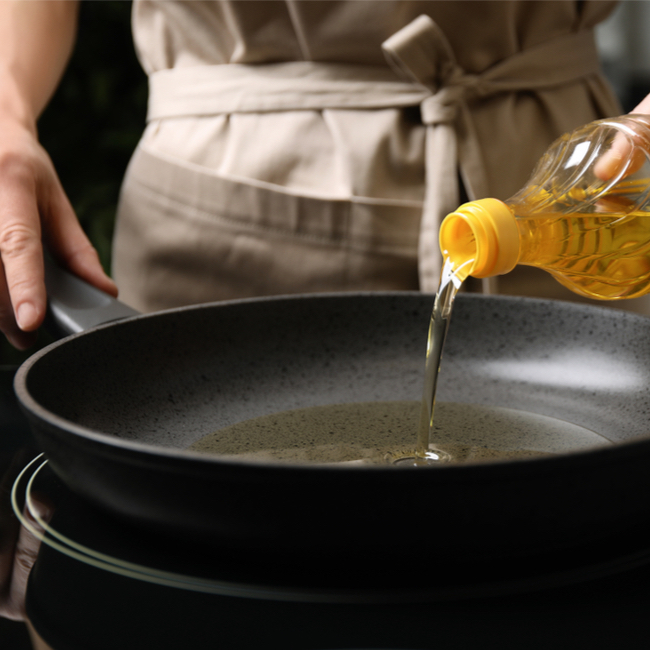This post has been updated since it was originally published on March 4, 2022.
You might already be aware that frequently cooking with processed oils (and eating many processed food items) can deter your weight loss goals, but some options are worse for your health than others. If you suffer from indigestion, inflammation and other gut or digestive-related issues, experts note that this one commonly used type of cooking oil might be a huge culprit. We checked in with NASM-certified nutritionist and health expert Reema Hannaford and registered dietitian Katie Krejci, MS, RD, LP, IFNCP to learn more about cooking with oils and how that could become an obstacle for healthy weight loss.


Seed Oils: Worst Cooking Oil Type For Weight Loss & Indigestion
Hannaford notes that seed oils, including products from grapeseeds, soybeans, peanuts and canola are the "absolute worst offending oils to cook with" in her experience. "Due to the high amount of processing they go through, they contain little to no nutrients and promote inflammation in the body," she explains, also noting anyone trying to lose weight should steer clear of palm and vegetable oil for the same reasons.
Cooking oils like these, Krejci adds, are high in unsaturated fat. "Unsaturated fats have one or more double-bonds, and thus, are liquid at room temperature (aka less stable)," she says. When unsaturated fats are exposed to high heat, their double bonds break. This breakage results in rapid oxidation (release of free radicals).

"Free radicals are highly damaging to the human body and can cause inflammation, premature aging, plus cellular membrane, mitochondrial and DNA damage," she says, citing research studies on the matter and her own experiences. Saturated fats, she says, are "much more stable and less inflammatory when heated," thanks to their absence of double bonds. The fatty acids stack neatly together, which is why it is solid at room temperature. "They naturally have a high smoke point of 350-450 degrees."
Krecji also notes that most of the oils that you’ll find on the market today are highly processed by way of massive pressure and high heat to extract the highest yield possible. "This exposure to high-heat not only causes free-radical production, but it denatures the naturally occurring vitamin E (an antioxidant), she says. This means that then, manufacturers add their own synthetic antioxidants (BHA, BHT and TBHQ), "which have endocrine-disrupting properties," as she cites. "To top it all off, sometimes the oil is also treated with a solvent (typically hexane)." Lastly, these cheap oils are often stored in a plastic bottle, which then leaches into the oil. (No thanks!)

What To Cook With Instead & How To Healthily Prepare These Oils
Both experts advocate for less-processed oils like unrefined olive oil, avocado oil and cold-pressed coconut oils. Because they are less processed, Hannaford says, "these oils maintain more micro-nutrients, are rich in antioxidants and health-promoting monounsaturated fatty acids," which is great news for your gut and your heart. Less processing, she explains, also means less inflammation."
Anti-inflammatory compounds like tocopherols, carotenoids, and polyphenols found in minimally processed olive oil promote good health, she says, while the preservation of its vitamins E and K play an active role in healthy body function, blood circulation, calcium metabolism and heart health."
A good rule of thumb, according to Krecji, is to only use fats that are solid at room temperature (high in saturated fats) for high-heat cooking. "This includes grass-fed ghee, grass-fed tallow, pasture-raised lard, and cold-pressed & unrefined coconut oil," she says, adding to "save your cold-pressed and unrefined olive oil" for low-heat applications such as salad dressings, dips or drizzling on pre-cooked food.


























